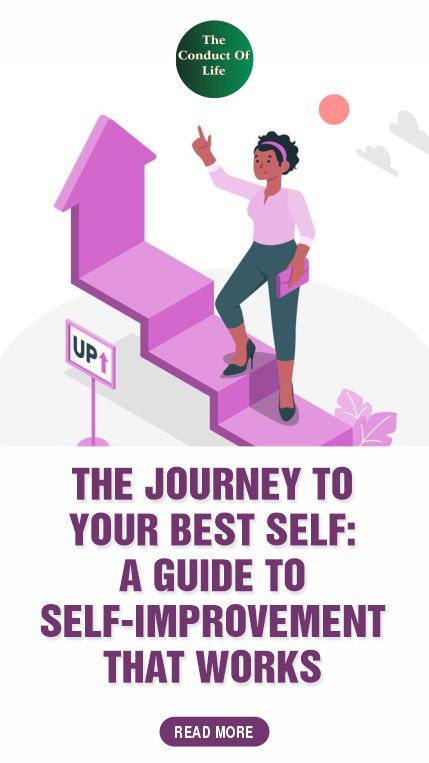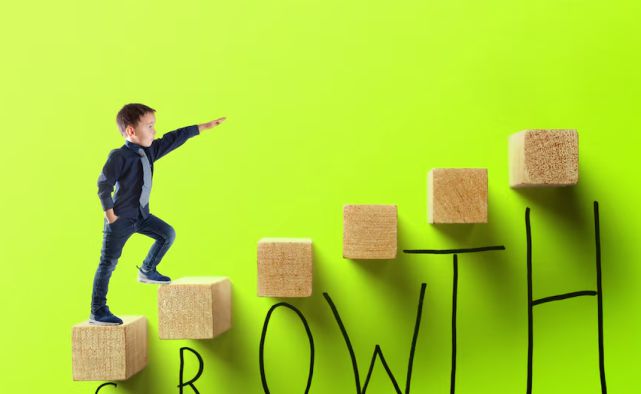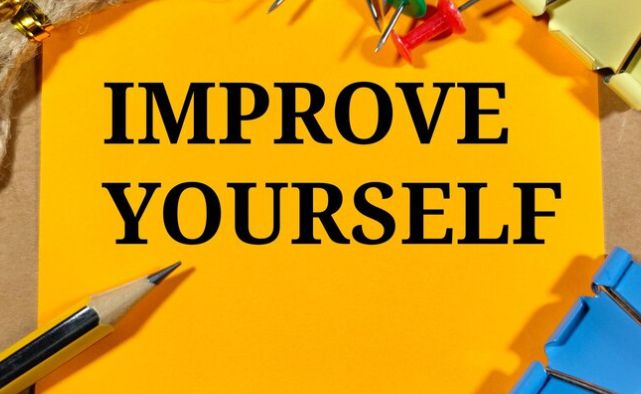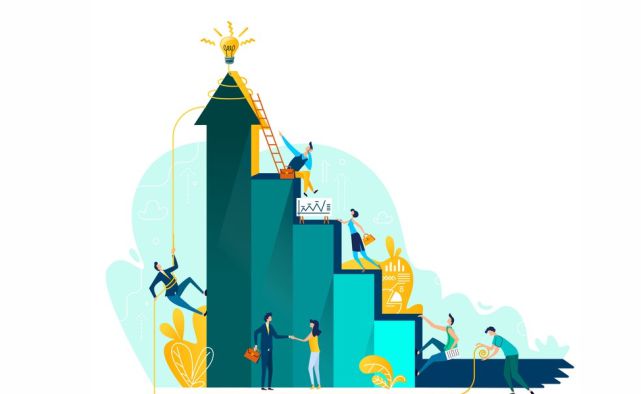Starting your personal growth and self-improvement journey can be confusing and daunting, but it should not be if you get the right guidance.
The path before you is a collection of small strides that accumulate into long distances, leading to either positive or negative life changes.
You must identify where you are, and the direction you want to go, and make visible progress.
At the onset, you should agree that growth is not a race, but a process you must be conscious of if you are to come out on the positive side of life.
If you operate your life blindly or by what comes each day, your life is on autopilot.
This is why, at Conducts of Life, we teach you how to live ahead and make all your steps meaningful through ethics and morality.
Certainly, everyone takes their own paths and determines their pace, so the comparison is unhealthy.
This guide will offer practical steps to begin your journey and help you build the daily habits that lead to lasting positive change.
Recommended: The Core Life Principles
You might want to pin the image below.

Key Takeaways
- Personal growth is a journey: It’s a continuous process that involves learning, adapting, and evolving emotionally, mentally, and socially.
- Self-improvement is about consistency: Small, daily changes in habits, skills, and mindset lead to big results over time, not overnight.
- Physical wellness supports all growth: A healthy body fuels your mental and emotional well-being, boosting focus, energy, and resilience.
- Emotional mastery enhances life’s navigation: Managing your emotions effectively helps you handle challenges, setbacks, and interpersonal relationships with balance and control.
- Feedback and progress tracking are vital: Regularly reflecting on your growth and seeking feedback ensures you stay on course for continuous self-improvement.
Related: 10 Powerful Examples of Transcendentalism
What is Self-Improvement and Personal Growth?
Self-improvement is making intentional efforts to better your skills and habits, one step at a time. It’s the small, consistent changes you make every day in the form of learning something new, managing stress better, or improving communication skills.

But here’s the thing: it’s not a quick fix. It’s a lifelong process of growth that involves trial, error, and persistence.
On the other hand, personal growth is the cumulative transformation that happens as a result of self-improvement.
It’s the way you evolve emotionally, mentally, and socially as you face challenges and learn from them.
Personal growth, according to Ralph Waldo Emerson’s The Conduct of Life, is not about reaching a specific destination, but the journey – becoming more resilient, adaptable, and sharpening self-awareness.
So, whether you’re focused on improving a particular skill or achieving a bigger change, both are important in shaping you into the life you desire.
Ready to get started? Let’s kick off your growth journey on the right foot!
Related Posts
What is Mindset, and Why Does it Matter?
Emotions: How Much Do They Control Your Life?
What is Conduct? The Basics of Your Existence
Emotions: How Powerful Can They Be?
Personal Growth Coaching Strategies
What is Self-Esteem? Everything to Know
The Psychology of Self-Improvement and Personal Growth: Why We Resist Change

Self-improvement is a key part of personal growth, but many people resist it. Even though you want to grow, psychological factors often hold you back.
Understanding these barriers is the first step in overcoming them and moving forward.
The Comfort Zone: Where Growth Stalls
Our brains are wired to keep us safe, which is why we naturally stick to what’s familiar.
The comfort zone feels predictable, but it also keeps you from growing.
Change brings discomfort, making it easy to stay stuck. Personal growth happens when you step outside of it.
Ego and Self-Sabotage: Holding Yourself Back
The ego often blocks growth. A fragile or inflated ego can create fear or pride, both leading to resistance.
This fear of failure can make you stick to old habits, even when they’re no longer serving you. Overcoming this requires self-awareness and a shift in mindset.
How to Overcome Resistance: Start Small, Grow Bigger
Breaking past resistance is easier with small steps. Instead of aiming for drastic change, start with manageable goals.
Achieving small wins boosts confidence and helps your brain adjust to change.
Before long, this leads to bigger transformations and sustainable growth.
The Path to Personal Growth: Awareness and Consistency
Recognizing the reasons behind your resistance is key to overcoming it.
Whether it’s your comfort zone or ego, awareness helps you break through.
With consistent effort, you can turn discomfort into growth, transforming challenges into opportunities for ongoing personal improvement.
Related: What is Self-Doubt? The Thief of Confidence
The Pillars of Self-Improvement and Personal Growth

At the core of self-improvement are four powerful pillars that guide you through building a better life.
These pillars:
- mental growth
- physical wellness
- emotional mastery, and
- skill development
…are the backbone of lasting personal growth and will set you on a path toward meaningful change.
Let’s take a closer look at each of them:
1. Mental Growth: Your Foundation for Change
Think of mental growth as the solid ground your self-improvement journey is built on.
It’s not just about thinking harder, but thinking differently.
Expanding your cognitive abilities helps you adapt, tackle challenges, and open yourself to new opportunities.
So, how can you actively work on it?
Start by prioritizing lifelong learning, maybe reading a new book, engaging in stimulating conversations, or practicing mindfulness.
Over time, these activities shape your mindset, boost creativity, and give you a more positive outlook on life.
However, remember that mental growth requires practice; it’s not just about acquiring knowledge, but also about becoming more adaptable in your thinking and taking effective action.
2. Physical Wellness: The Power of a Healthy Body
A healthy body is the canvas for all your achievements. The vehicle and medium enable emotional, mental, and physical interaction to occur.
A healthy body doesn’t just support your physical well-being; it fuels your mental and emotional health, too.
Physical wellness is a pillar because it impacts everything from energy levels to how you handle stress.
Whether it’s hitting the gym, doing yoga, or simply walking every day, movement is involved.
And let’s not forget proper nutrition and sleep, they’re just as important too. When you treat your body well, your mind follows.
It’s simple: taking care of your body leads to improved focus, better mood, and the stamina to pursue your goals.
3. Emotional Mastery: Navigating Your Inner World
How do you handle stress, setbacks, or even small annoyances? Your level of emotional mastery determines how well you navigate life’s ups and downs, whether they hijack your emotions or you are fully in control.
Emotional mastery is about understanding your feelings and taking control of how you react.
If you always regret your actions and know a better way you should have handled a situation when it is already too late, then you have to pay rapt attention to this article.
One of the best things you can do for yourself in life is to always own your actions, and even if you must do something crazy, make sure you already know the outcome and consequences, and won’t be shocked.
When you have a firm grip on your emotions, then you are wielding the most power in life and this can be achieved by having strong self-control and discipline.
4. Skill Development: Constantly Evolving
Skill development is where the action happens. It’s about learning new things, improving what you already know, and staying flexible.
Whether you’re working on job skills or picking up a fun hobby, this is your chance to adapt and stay relevant.
Try a new workshop, sign up for an online course, or simply learn something hands-on.
Every time you gain a new skill, you build confidence, both at work and in life.
The best part? It doesn’t just help you grow; it opens up new opportunities and boosts your self-esteem.
Bringing it all Together: A Holistic Approach to Growth
Now that you’ve got the four pillars, let’s talk about what makes them work together.
Self-improvement and personal growth aren’t isolated experiences because they build on each other.
Mental growth gives you the mindset to tackle challenges. Physical wellness keeps you energized to take on your goals.
Emotional mastery helps you stay balanced when things don’t go as planned. And skill development provides the practical tools to succeed.
Each pillar feeds into the next, creating a well-rounded, holistic approach to becoming the best version of yourself.
And remember, as you will see in this article, growth isn’t a race; it’s a journey that evolves.
Related: What Self-Talk Means – Everything to Know
The Root of Personal Growth: Building a Strong Foundation

As you will hear most often in this article, personal growth starts with self-awareness and maybe, strong life events that jolt you out of your reverie.
As reiterated by Life Next Level, his awakening in personal growth happened after negative life events that beat him in line.
This consciousness is the first step toward making meaningful changes in your life.
By understanding yourself, your values, blind spots, and triggers, you lay the groundwork for growth that truly sticks.
Let’s explain further:
Recognizing Personal Values: Your Guiding Compass
Knowing your values is central to growth. They help you make decisions that align with your true self.
Try reflecting through journaling with prompts like, “What is a priority to me?” or “What do I stand for?”
These questions can help guide your path and keep you focused on what matters.
Identifying Blind Spots: What You Don’t See Holds You Back
Blind spots are areas where you may be unaware of things holding you back.
Sometimes, we miss these because they are hidden in plain sight.
Getting feedback from trusted friends or mentors helps uncover these spots.
It might be uncomfortable, but confronting them is key to moving forward.
Managing Triggers: Controlling Emotional Reactions
Triggers are emotional responses to certain situations. Understanding what sets you off puts you at an advantage.
By being aware of these triggers, you can develop strategies to handle them better, such as practicing mindfulness or cognitive restructuring.
This helps keep your emotions in check and your actions intentional.
Aligning Goals with Your Identity: Avoiding Burnout
Setting goals that align with who you truly are helps to sustainable growth.
It’s easy to chase what society expects or what others think you should do, but that can lead to burnout.
Instead, make sure your goals resonate with your core values and identity to stay motivated and energized in your journey.
When I started the journey in writing, it was about things that I thought would bring fortune, but I burned out pretty quickly until I found what is at the core of my identity.
The Benefits of Self-Improvement and Personal Growth

Self-improvement and personal growth go hand in hand. When you focus on growing as a person, you unlock opportunities for a more fulfilling life.
Here’s how investing in both can benefit you in meaningful ways.
1. Boost Your Confidence and Self-Awareness
As you begin your journey into self-improvement, you start to see yourself more clearly, both your strengths and areas to improve.
This clarity in self-awareness is key to building confidence. Personal growth pushes you to embrace who you are, while also motivating you to work on becoming a better version of yourself.
The more you invest in this, the more you believe in your ability to handle whatever life throws your way.
2. Strengthen Your Relationships and Emotional Intelligence
Personal growth is deeply connected to how you connect with others.
As you improve yourself, you also build stronger communication skills, like active listening and empathy.
These skills help you relate to others better, which can improve both personal and professional relationships.
The more emotionally literate you become, the more you create meaningful bonds that support your journey.
Better relationships fuel your growth, creating a circle of support.
3. Achieve Your Goals and Build Resilience
As emphasized by Ralph Waldo Emerson, goals are achieved by self-reliance and resilience.
Personal growth encourages you to set and pursue goals that matter to you.
It could be career success or focusing on your mental health; each goal you achieve strengthens your resilience.
The process of self-improvement helps you break down obstacles, learn from mistakes, and keep going even when things get tough.
With every small step you take, you’ll feel more motivated and ready to tackle bigger challenges.
4. Embrace Change and Evolve Continuously
Self-improvement and personal growth are all about accepting change and life transitions.
Life is full of surprises, and by growing personally, you learn to handle those changes with a positive mindset.
As you move forward, you develop the flexibility to adapt, learn from setbacks, and stay open to new experiences.
The journey of growth doesn’t have an end; each day offers a chance to evolve into a stronger, wiser you for a greater impact and legacy in life.
Self-improvement is a System, not a Goal

Self-improvement is about building a system, not just chasing goals.
When you focus only on reaching one goal, it can feel like a race, and if you don’t hit the target fast enough, it’s easy to get discouraged.
But if you create a system for constant growth, the process becomes part of your daily life, and the progress will follow easily.
Here is how to approach this:
Building Daily Rituals: The Key to Lasting Growth
A self-improvement system is made up of daily rituals that help you build better habits.
Yes! These rituals might be things like waking up early, exercising regularly, reading, or even writing in a gratitude journal.
The goal isn’t just to hit a target but to create habits that help you grow every day.
This shift in mindset helps keep you on track for long-term success.
The Power of Feedback: How to Keep Improving
To make your self-improvement system work, you need feedback. That means checking in on your progress regularly.
You can do this by journaling your experiences, asking friends or mentors for advice, or using apps that track your development.
By reflecting on what’s working and what’s not, you can tweak your routines and keep improving.
Feedback is a tool that makes sure you’re always moving forward.
Tracking Progress: Seeing Your Growth
Tracking your progress is a simple but powerful way to stay motivated.
Whether you use a goal-setting method like SMART goals or just jot down milestones along the way, keeping track of what you’ve accomplished gives you a clear picture of your growth.
When you see how far you’ve come, it keeps you focused and helps you keep going, even when things get tough.
Resilience Through Systems: Staying Adaptable
By focusing on building a self-improvement system, you become more resilient.
Instead of aiming for one big win with a big futile leap, you’re constantly adjusting and adapting, making it easier to handle challenges in chewable chunks.
This system approach helps you grow and ensures that your growth continues over time. It’s about setting yourself up for long-term success.
The Emotional Side of Self-Improvement: Dealing with Setbacks
Self-improvement isn’t always smooth sailing, of course, nothing is a sure banker!
It’s common to face setbacks that feel discouraging, but they aren’t signs of failure.
Instead, they are part of the growth process. Every setback provides a chance to reflect, learn, and adjust.
By accepting this, you can build emotional resilience, which is a building block for personal growth.
Setbacks Are Part of the Process: Embrace Them
When you hit a roadblock, it’s easy to feel frustrated. But it’s important to understand that setbacks are natural.
They’re not signs of defeat but opportunities to assess what’s working and what needs to change.
Embrace challenges as part of your growth, and you’ll be better equipped to move forward stronger.
Self-Compassion: Be Kind to Yourself
After a setback, being kind to yourself can make a huge difference. Instead of criticizing yourself, practice self-compassion.
Treat yourself the way you would treat a close friend going through a tough time.
Research shows that being kind to yourself after failure helps you recover emotionally and builds the resilience needed for growth.
Emotional Mastery: Tools to Overcome Setbacks
When setbacks happen, staying in control of your emotions is key.
Practices like mindfulness can help you stay aware of your feelings without being overwhelmed by them.
This gives you the clarity to respond thoughtfully instead of reacting impulsively with a hijacked emotion.
You can also use cognitive restructuring to change negative thoughts, seeing failures as lessons instead of obstacles.
Turning Setbacks into Stepping Stones for Growth
The emotional side of self-improvement involves bouncing back from setbacks, not avoiding them.
The key to personal growth is learning to find your way around these challenges with resilience and self-compassion.
By doing so, you create obstacles and opportunities, turning every setback into a chance for growth and making your journey of self-improvement stronger and more sustainable.
Self-Improvement Beyond the Self: Making a Greater Impact
Self-improvement is often seen as a stand-alone pursuit, but it can extend to benefit the greater community.
By shifting from “me-focused” to “we-focused” growth, we can enhance both personal and collective well-being.
- Engaging in community service or collaborative projects allows you to develop skills like empathy, effective leadership qualities, and teamwork, while also creating meaningful relationships.
- Mentorship further strengthens this approach, as guiding others reinforces your growth and promotes mutual development. Studies show that workplaces and neighborhoods that focus on collective growth experience higher morale, productivity, and stronger social connections.
Advanced Strategies for Long-Term Growth
As you embark on your journeys of self-improvement, you might reach a stage where advanced strategies can enhance your growth trajectory.
Two innovative approaches:
- micro-mastery and
- biohacking
… have gained traction for their effectiveness in enforcing long-term development.
Let’s see how:
Micro-Mastery: Breaking Down Big Goals
Micro-mastery involves breaking complex skills into smaller, manageable parts.
By mastering each component, you can avoid feeling overwhelmed and make consistent progress.
For example, if learning a new language, start with common phrases instead of tackling everything at once.
Over time, these small wins add up, building competence and confidence.
This method highlights patience and persistence as key drivers of long-term growth.
Biohacking: Optimizing Mind and Body
Biohacking involves using personal experimentation to optimize your physical and mental well-being.
It includes lifestyle adjustments such as diet, exercise, mindfulness, and sleep optimization.
For example, adjusting your sleep schedule based on patterns can improve cognitive function and boost your health.
This method helps improve your body and mind, giving you more energy for self-improvement.
Combining Strategies for Lasting Growth
Using both micro-mastery and biohacking together can create a powerful, well-rounded approach to growth.
As you refine your skills, you also boost your mind and body.
This combination leads to sustainable, long-term self-improvement by addressing both mental and physical aspects of personal development.
The Dark Side of Self-Improvement: Avoiding Toxic Growth Culture
While the journey of self-improvement is often celebrated, it is good to acknowledge that it can also harbor potential pitfalls that lead to a toxic growth culture.
1. The Risk of Self-Obsession
Self-improvement can easily slip into self-obsession, where you constantly compare your growth constantly to others.
Instead of focusing on your journey, you measure success by how you stack up against peers.
It’s important to stay focused on your progress and appreciate your unique growth path, rather than trying to meet someone else’s standards.
2. Burnout from Perfectionism
The drive for constant improvement can also lead to burnout. Striving for perfection often brings stress, neglecting other areas like relationships or self-care.
It’s good to balance growth with relaxation and enjoyment, so you don’t end up overwhelmed or drained by the pursuit of perfection.
3. Toxic Positivity and Emotional Balance
Toxic positivity is another issue in the self-improvement world. It’s the belief that you should always be happy and successful, ignoring the reality of negative emotions.
Suppressing these feelings can be harmful. Recognize that it’s okay to experience struggles and setbacks; accepting both growth and challenges is key to long-term personal development.
Finding Balance with Self-Awareness
To avoid falling into a toxic growth culture, practice self-awareness.
Regularly reflect on your goals and make sure they align with your values.
When the pressure feels overwhelming, step back and evaluate if the journey is still fulfilling.
Focus on progress, not perfection, and create a supportive environment to help you grow without compromising your well-being.
The Truth About Getting Your Life Together: You’re Never Fully ‘There’
The idea of “having it all together” suggests perfection, but that’s not the reality. Personal growth is a continuous journey, not a final destination.
No matter where you are in life, there’s always room to learn and adapt. Perfection isn’t achievable, and striving for it can lead to frustration.
Instead, embrace your imperfections as part of the process. Focus on progress, even in small steps, and celebrate victories along the way.
Understand that self-improvement is lifelong, and there will always be new challenges to face.
Life’s twists require flexibility and resilience. Embrace the ongoing nature of growth, and recognize that understanding yourself is a journey, not a race.
Conclusion
Your personal growth journey is about embracing gradual, consistent change.
It’s not a race, but a lifelong process that’s shaped by your mental, physical, emotional, and skill development.
As you set small goals and build positive habits, remember that setbacks are simply part of the process.
Stay patient, track your progress, and adjust as needed. What small step can you take today to start or improve your journey?
By building a system of growth, you’ll see meaningful changes over time. Keep going, and let your transformation unfold naturally! What’s your next move on this path?
Frequently Asked Questions
What is the difference between self-improvement and personal growth?
Self-improvement involves intentional efforts to enhance skills and habits daily, while personal growth is the overall transformation from those changes, fostering emotional, mental, and social evolution.
How do I start my personal growth journey?
Begin with self-awareness by identifying values, blind spots, and triggers. Set small, aligned goals, build daily habits, seek feedback, and prioritize consistency over speed for lasting progress.
What are the pillars of self-improvement?
The four pillars are mental growth through learning and adaptability, physical wellness via exercise and nutrition, emotional mastery for handling feelings, and skill development for ongoing evolution and confidence.
Why do people resist change in self-improvement?
Resistance stems from comfort zones providing safety, ego-driven fear of failure or pride, and self-sabotage habits. Overcoming it requires awareness, small steps, and a shifting mindset for sustainable growth.
How can I overcome setbacks in personal development?
Embrace setbacks as learning opportunities, practice self-compassion, use mindfulness for emotional control, reframe negative thoughts, track progress, and build resilience through consistent systems rather than chasing perfection.
Pious Clements is the insightful voice behind "The Conducts of Life" blog, where he writes about life ethics, self-development, life mastery, and the dynamics of people and society.
With a profound understanding of human behaviuor and societal dynamics, Pious offers thought-provoking perspectives on ethical living and personal growth.
Through engaging narratives and astute observations, he inspires readers to navigate life's complexities with wisdom and integrity, encouraging a deeper understanding of the human experience and our place within society.
